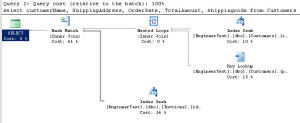Parameter sniffing
This seems to come up again and again on the forums.
At its heart, parameter sniffing is the ability of the SQL Server optimiser to know the values of parameters passed to a stored proc at the point that it compiles the procedure. The idea is that if the parameter values are known, then the appropriate column statistics can be used and the optimiser can estimate the number of rows that the various query operators will have to process for various different possible execution plans.
Since the approximate number of rows is known, the cost of each possible plan can be more accurately calculated and a more accurate execution plan can be selected.
So, why is parameter sniffing so often a problem? Well, mainly, because parameter values do change.
